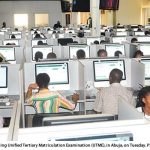ON Tuesday, October 18, the Senate called on the President Muhammadu Buhari-led administration to set machinery in motion to conduct a housing and population census in 2018. A census was last conducted in the country between March 21 and 30, 2006 during the administration of President Olusegun Obasanjo, and another one ordinarily ought to be held this year following a United Nations provision.
The Senate’s move followed a motion by Senator Suleiman Hunkuyi entitled “A call for the Federal Government to Expedite Action on the Planned 2018 National Census.” Hunkuyi said: “The population census should be carried out within an adequate timing and an objective of conducting an acceptable exercise. The Secretary to Government of the Federation (SGF), NPoPC, Ministry of Budget and National Planning and other supervising agencies must make adequate provision in 2017 budget as critical prerequisite to achieving 2017/2018 population census.” And contributing to the discussion, Deputy Senate President Ike Ekweremadu said: “As we approach the next census, we must take advantage of the developments in technology and make the results of the exercise acceptable. We want this exercise to count; every Nigerian must be counted and no one should be counted twice. If we do this, we will be able to plan.”
To be sure, no country makes meaningful progress without possessing relevant data on population figures. Nigeria, Africa’s most populous country, is notorious for the lack of relevant data for national planning, despite boasting a host of agencies saddled with that responsibility. In any case, anytime a census is done, there is usually no agreement on the results arising from the bitter ethno-political rivalry within the country and the potentiality of a census to shape regional, state and ethnic relations and the balance of power. Thus, the results of the first post-independence census conducted in 1962 were withdrawn, and the 1963 figures were derided. The results of the 1973 census were discarded, and the 1991 census which put Nigeria’s population at 88.9 million was hotly disputed. The first page of the census form provided space to list up to nine members of a household, and hardly any household reported a lower figure.
Prior to the 2006 census, there was acrimony between the North and the South over the agitation by Northern elite that vital issues such as ethnicity and religion be left out of the census questionnaire. Worse still, thousands of unpaid enumerators abandoned the job in anger during the exercise. On December 30, 2006, the results announced by Samu’ila Makama, then chairman of the National Population Commission (NPC), put Nigeria’s population at 140 million, with the North being 75 million persons and the South, 65 million persons.
Predictably, the results turned out to be controversial, not least because it indicated that there were more males than females in the country. Ohaneze Ndigbo said it had reduced the Igbo to a minority ethnic group; a state governor, Orji Uzor Kalu, quipped that his domestic servants were not even enumerated, while Governor Bola Tinubu of Lagos flatly rejected the state’s official figure of 9,013,534 persons and went ahead to put the “authentic figure” at 17,553,924 persons. This made Makama to accuse some states of breaching the constitution by usurping the NPC’s responsibility. Academics in the North however welcomed the results, pointing out that early marriage was more common in the zone, and that the North being mostly polygamous would have more population than the mostly monogamous South.
However, confirming the politicisation of census results, Chief Festus Odimegwu, then chairman of the NPC, said in August 2013: “No census has been credible in Nigeria since 1816. Even the one conducted in 2006 is not credible. I have the records and evidence produced by scholars and professors of repute. If the current laws are not amended, the planned 2016 census will not succeed. Nigeria has run on falsehood for too long. It is either we do an accurate census or we will not do anything.”
Partly because the federal allocation formula gives population a weighting of 44 per cent and given the implications for representation in the National Assembly, census exercises in the country have over the years tended to be prosecuted like a war. Yet the question can be asked whether anyone has ever seen developed countries like the USA conducting a population census. Countries desirous of growth and development simply take advantage of technology to determine their population strength. Nigeria has many sources of information, including the biometric verification number (BVN) for banking transactions, the national identification card, the permanent voter card (PVC), driver’s licence and international passport, among others. Even though these data pools cannot realistically be expected to capture Nigeria’s entire population given the state of development and infrastructure, it is saddening that no serious effort has been made to harness their potential gains.
What is more, the primary health centres which are supposed to be gathering data are ill-equipped for the task, and countless numbers of Nigerians are still far from civilisation, trapped in appalling conditions. A significant percentage of births are not in the formal sector, and government must look at how to bring the informal demographics into the formal sector through aggressive provision of infrastructure. This last point cannot be stressed enough, because rapid urbanisation has the benefit of co-opting previously neglected populations into the national matrix.
Thus, while we are not against a population census being held in 2018, we urge the Federal Government to explore other means of getting population figures at any point in time, especially with the use of technology.
WATCH TOP VIDEOS FROM NIGERIAN TRIBUNE TV
- Relationship Hangout: Public vs Private Proposals – Which Truly Wins in Love?
- “No” Is a Complete Sentence: Why You Should Stop Feeling Guilty
- Relationship Hangout: Friendship Talk 2025 – How to Be a Good Friend & Big Questions on Friendship
- Police Overpower Armed Robbers in Ibadan After Fierce Struggle




